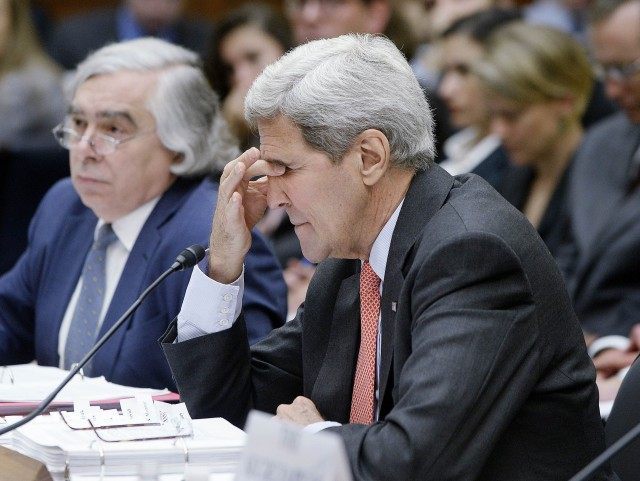During his testimony on Tuesday before the House Foreign Affairs Committee, Secretary of State John Kerry admitted that states may retain their own sanctions against Iran. However, Kerry said, the Obama administration “will take steps” to urge the states “not to interfere.”
Kerry was asked about the argument–first presented at Breitbart News, and then in the Wall Street Journal and elsewhere–that state and local sanctions against the Iranian regime remain in effect, even though the Iran deal obligates the U.S. government to attempt to remove them. The question came from Rep. Ron DeSantis (R-FL):
DeSantis: Because this is not going to be ratified as a treaty, there are a lot of states–and Florida, particularly–where state legislatures have enacted sanctions against Iran in various capacities. Do you acknowledge that this deal will not affect states’ ability to do it–since it’s not going to be approved as a treaty, it’s not going to be considered the supreme law of the land, it’s going to be more of an executive-to-executive agreement?
Kerry: That’s accurate, but we would urge those states, if Iran is fully complying with this agreement, we will take steps to urge them not to interfere with that.
Kerry did not specify what the “steps” would be.
There are 30 states with laws divesting from Iran, as well as roughly a dozen with laws preventing state governments from contracting with certain Iranian companies, or companies doing business with Iran in specific capacities. This week, legislators from New York and California confirmed to Breitbart News that they had no intention of rolling back sanctions against Iran, especially given Iran’s support for terror.
According to the Supreme Court’s holding in Medellín v. Texas, even a treaty cannot override state law without enabling federal legislation.
The Iran deal specifies that new sanctions will release Iran from its obligations, meaning a state could, in theory, trigger the end of the deal.

COMMENTS
Please let us know if you're having issues with commenting.